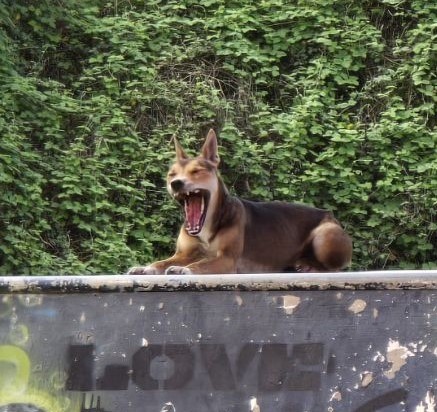
UPDATE: Dingoes still alive after council "takes steps" to protect public safety
Port Douglas Dingoes

Victorian-based “dingo warrior” Jenny Parker says there is no need for her to come to Port Douglas in a bid to save a pair of young dingoes blamed for attacking pet dogs and stalking people in the Port Douglas Sports Complex because “council have already taken matters into their own hands’’.
First claiming reports of a Christmas Day attack on two pet dogs by the dingoes released by Douglas Shire Council was “a false report’’, Ms Parker vowed to make a mercy dash to Port Douglas in a bid to protect the dingoes and provide advice and education to the public on how to live in harmony with them.
But, after not responding to calls and messages for an update since December 26, Ms Parker has now told Newsport that she won’t be coming because she had received advice from council that they had “taken matters into their own hands’’.
It comes as one Newsport reader, Gary Lee, suggested he sees the pair of dingoes daily at a location he did not disclose.
Ms Parker added that she had spoken to key people in council who reassured her that while the dingoes had not yet been exterminated, efforts were still underway to capture and destroy them.
“Because of Queensland legislation, public safety is of utmost importance,’’ she said.
“Farmers in the area have an obligation to manage dingoes on their land as do the Shire in public places. If or when these dingoes are captured, then they will euthanise them.
“Habituated dingoes can be dangerous in urban areas.’’
Ms Parker also produced correspondence from Douglas Shire Council’s Biosecurity Team which supports claims of dingo advocates that they had taken some action in the wake of the Christmas Day attack.
“We understand your apprehensions and appreciate the opportunity to clarify Douglas Shire Council’s actions and approach to managing this issue,’’ a letter sent on January 6 to Ms Parker from Team Leader Biosecurity Brad Everett says.
“Over the past several months, the Council has received numerous reports regarding two dingoes exhibiting problematic behaviour. These incidents include stalking residents, scavenging food scraps from restaurants and resorts, and displaying increasingly dangerous behavioural signs.
“Unfortunately, when dingoes become habituated to humans - often due to feeding or other forms of encouragement - the risk of unsafe interactions significantly increases.
“While dingoes are typically not aggressive, they can pose a safety risk in urban areas by scavenging, stalking, or attacking domestic pets.
“Douglas Shire Council’s biosecurity officers do not interfere with dingo populations unless the animals present a clear threat on private or council-controlled lands.
“When such behaviour arises, we act on a case-by-case basis, consulting Traditional Owners, Indigenous ranger groups, Queensland’s Department of Agriculture and Fisheries, and the Department of Environment and Science as needed.
“In this case, the behaviour of the dingoes in question escalated to an unacceptable public safety risk. The Council has taken steps to address the immediate situation and prevent recurrence.
“To that end, we will be erecting signs around Port Douglas to educate the public on the dangers of feeding wild animals, which can significantly alter their natural behaviour.’’
The letter states Council officers worked closely with the State Government to resolve the matter responsibly and in accordance with legislative requirements.
“Please rest assured that every action taken prioritises public safety while respecting the natural behaviour and habitat of wildlife,’’ the letter concluded.
COUNCIL RESPONDS TO QUESTIONS
A council spokesperson has responded to questions from Newsport this morning to confirm that Douglas Shire Council had not captured or euthanised the dingoes.
Has Douglas Shire Council or one of its employees relocated the two dingoes?
No, the two dingoes have not been relocated.
What steps were taken by Council to "address the immediate situation and prevent recurrence of the unacceptable public safety risk"?
To address the immediate safety concerns, the Council installed temporary warning signs on January 9, 2025, in areas frequently visited by the dingoes. Information fliers have also been distributed at the Sheraton Grand Mirage and at backpacker hostels. These signs and fliers are aimed at raising public awareness and preventing further incidents. The situation will continue to be monitored, and additional measures will be taken as necessary.
Are the steps taken supported by the Queensland Biosecurity Act?
Yes, the actions taken by the Council are fully supported by the Queensland Biosecurity Act. The steps are in line with the guidelines within the Act, ensuring that the situation is managed appropriately to protect public safety while complying with legal requirements regarding wildlife management.
Are signs and advice to educate the public to be erected in areas of the Douglas Shire, and if so, where and by when?
Yes, temporary signs and advisories have been installed at key locations, including the entrances to the sporting complex, Wharf Street, and the service road. These were put in place on January 9, 2025.
Are dingo traps still set in Port Douglas?
Council is still actively trapping.
Is there any consideration State Government officials have acted to resolve this matter or individuals/community members have relocated the dingoes?
No. Dingo management is a Council responsibility under the Biosecurity Act. While it is not up to Council to speculate whether or not community members have relocated the dingoes, we would discourage this behaviour for safety reasons.
Support public interest journalism
Help us to continue covering local stories that matter. Please consider supporting below.
